“In Puerto Rico, I have stability, I have happiness,” says one of the subjects of the Netflix documentary After Maria. She and two other women (Glenda, Kenia and Sheila) are followed through their evacuation to New York after Hurricane Maria. The film was directed by Nadia Hallgren and produced by Lauren Cioffi, and is currently showing on Netflix.
The film begins with the devastation of Puerto Rico by the hurricanes. The women’s homes were destroyed and they ended up in FEMA-funded hotel rooms in the Bronx. The film focuses on the weeks before and directly after the end of the FEMA housing.
The women are shown trying to find jobs and homes. They’re also shown trying to keep up one another’s spirits, their own, and their families’ as well. Footage of parties, dancing, and shopping trips are mixed in with a discussion of the teenager’s experience talking with a psychologist, the families packing up for their eviction from the hotel, and endless phone conversations with agencies which fail to produce any results.
The families were still staying in shelters when the documentary began airing on Netflix.
“They don’t help with anything,” one woman says as the group waits at a FEMA office. A stranger translates for her and encourages her. But there is no happy ending to the story. The women and their families are left homeless, saying, “…and hurricane season is coming again.”
Negative reactions
Petitions asking Netflix to remove the documentary from its listings have gathered tens of thousands of signatures. Some object to the emphasis on evacuees rather than the people who stayed on the Island, but one is more specific: “This documentary disrespects the honor, values and working spirit of our commonwealth by ridiculizing us as poor, inconsiderate and maintained by (FEMA).”
Hallgren explained to the Guardian that she did not intend to produce a portrait of Puerto Rico or the hurricanes, but to show another chapter in New York’s Puerto Rican community. Her grandmother came to the Bronx from Puerto Rico, and Hallgren sees the hurricane evacuees as “another way to illustrate what that migration looks like.”
Cioffi told the Guardian that “it was amazing to see how much daily joy they had as a community and as a family network. They would find ways to create joy for themselves.”
Resilience
The resilience of the women is a central theme of the story.
“I need to stay strong in my heart to survive with my daughter,” Kenia says. She attempts to find an apartment, coping with communication problems, technical issues, and a general lack of affordable housing.
FEMA offered hotel residents a one-way ticket back to Puerto Rico, but after months in New York the women have no funds, no homes to return to, and no jobs in Puerto Rico. “We have no resources to go forward,” they say.
But they also have no jobs and no homes in New York. FEMA has not provided help with work or housing. They have been given a temporary place to stay, but no more than that. Life is difficult and it doesn’t look as though it will improve. They remain courteous and cooperative.
Solutions
Is resilience under these circumstances something to be celebrated? Or should there be some focus on the need for change?
There is just one section of the film that references possible action: an interview with Governor Rossello.
“Puerto Rico is a colonial territory,” said the Governor. “We are the most populated colonial territory in the world… Do you support eliminating colonial territories in the world in the 21st century? Do you support statehood for Puerto Rico? All we are asking is to be treated equally.”
Puerto Rico has not been treated equally with the states in the matter of disaster assistance. The aftermath of Hurricane Maria has made it more obvious to many that being an unincorporated territory is a negative.
But Puerto Rico has been dealing with that negative for over a century. Federal funding for necessities like health care and roads is also unequal to the funding in the states. Electricity was costly and unreliable even before the hurricanes.
With no senators or voting members of Congress, Puerto Rico cannot get the political influence needed to attain equality. Click To TweetTell your legislators that it is time for statehood for Puerto Rico. Now.








No responses yet